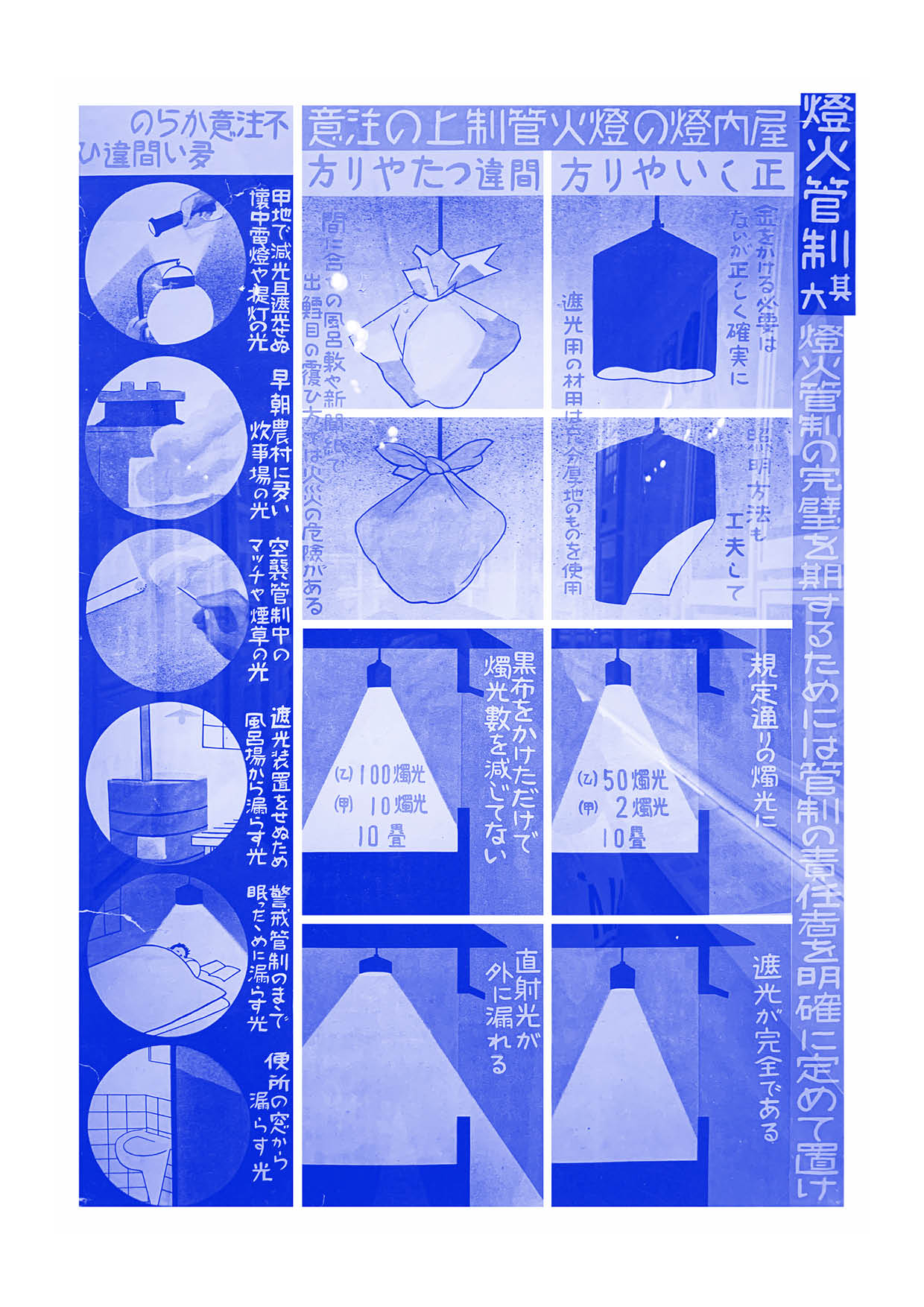
“Wartime Blackouts”
Failure of system, Advertising, Electric, Regional, World War, Blackout, Illustration
The failure of the system of advertising is related both to censorship and war-time. During World War II, the Japanese government directives severely restricted freedom of advertising and it was reduced to military-led propaganda. Designed to enhance national prestige, fighting spirit and accept austerity at home, advertising played a role in fueling war. Certainly, resources were limited after the war, and so, paper was in short supply, reducing the dissemination of newspapers, magazines. In these days, in the same context, lack of energy resources would also limit the broadcast of information electronically in films, radio, music, television and internet.
The poster published by the Japan Air Defense News Parliament in 1944 warns people to heed blackout times and restrict their daily life and light usage. 1 In preparation for the expected war, a wartime blackout is the practice of collectively minimizing outdoor light, to prevent enemy planes from being able to identify their targets by sight. A list of detailed warnings about what to do during mandatory blackouts and how to control light is graphically represented to ensure people didn’t inadvertently become targets during nighttime air raids. The information was drummed into every citizen by sticking the poster up on tonarigumi 2 noticeboards and meeting halls.
Finally, after the war, Japan abolished all restrictions on Freedom of Speech, and prohibits formal censorship, although effective censorship of pornographic content does exist. Interpreted in different ways, the sale and distribution of obscene images, drawings or other objects, including recordings and electronic media is restricted under the Criminal Code (1907). The regulatory spirit is blurry since the definition of "obscenity" is absent from the code itself, and so multiple interpretations have developed through the years.
1. Specific indications in the poster include “Control your light usage in your lamps”, “Use the specified material for fast light and complete shading”, “Just put on a black cloth”, “Avoid light leak out”, “Coming from Korea, they will go deep into a rural area early in the morning with a G fire”.
2. Tonarigumi (隣組), were Neighborhood Association established by the Japanese government during World War II. It consisted of units of 10-15 households organized for firefighting, civil defense, police informants and internal security. Although it was formally abolished in 1947, the system remains in modern times as chōnaikai (町内会) or jichikai which is a Japanese local community of citizens with limited responsibility for local administration and coordination of activities such as neighborhood watch and disaster relief.
Failure of system, Advertising, Electric, Regional, World War, Blackout, Illustration
The failure of the system of advertising is related both to censorship and war-time. During World War II, the Japanese government directives severely restricted freedom of advertising and it was reduced to military-led propaganda. Designed to enhance national prestige, fighting spirit and accept austerity at home, advertising played a role in fueling war. Certainly, resources were limited after the war, and so, paper was in short supply, reducing the dissemination of newspapers, magazines. In these days, in the same context, lack of energy resources would also limit the broadcast of information electronically in films, radio, music, television and internet.
The poster published by the Japan Air Defense News Parliament in 1944 warns people to heed blackout times and restrict their daily life and light usage. 1 In preparation for the expected war, a wartime blackout is the practice of collectively minimizing outdoor light, to prevent enemy planes from being able to identify their targets by sight. A list of detailed warnings about what to do during mandatory blackouts and how to control light is graphically represented to ensure people didn’t inadvertently become targets during nighttime air raids. The information was drummed into every citizen by sticking the poster up on tonarigumi 2 noticeboards and meeting halls.
Finally, after the war, Japan abolished all restrictions on Freedom of Speech, and prohibits formal censorship, although effective censorship of pornographic content does exist. Interpreted in different ways, the sale and distribution of obscene images, drawings or other objects, including recordings and electronic media is restricted under the Criminal Code (1907). The regulatory spirit is blurry since the definition of "obscenity" is absent from the code itself, and so multiple interpretations have developed through the years.
1. Specific indications in the poster include “Control your light usage in your lamps”, “Use the specified material for fast light and complete shading”, “Just put on a black cloth”, “Avoid light leak out”, “Coming from Korea, they will go deep into a rural area early in the morning with a G fire”.
2. Tonarigumi (隣組), were Neighborhood Association established by the Japanese government during World War II. It consisted of units of 10-15 households organized for firefighting, civil defense, police informants and internal security. Although it was formally abolished in 1947, the system remains in modern times as chōnaikai (町内会) or jichikai which is a Japanese local community of citizens with limited responsibility for local administration and coordination of activities such as neighborhood watch and disaster relief.


